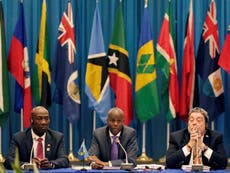The Home Office is locking up victims of slavery. Will Priti Patel do the right thing and end this cruelty?
Are we OK with indefinitely detaining victims of exploitation just because of their immigration status? This is the question the new home secretary desperately needs to answer

The new home secretary has the opportunity to make a real difference to trafficking victims’ lives: she can end the practice of locking them up in immigration detention. It beggars belief that the UK would take away the liberty of people who’ve experienced severe exploitation – but it’s happening.
Aside from being morally unacceptable, this also puts the UK potentially in breach of international obligations on our responsibilities towards victims, including the Council of Europe Convention on Action against Trafficking in Human Beings and the EU Victims’ Rights Directive.
Ample evidence now shows that hundreds of victims of human trafficking are being locked up in immigration detention centres in the UK. Today, a joint report from Focus on Labour Exploitation, Ashiana Sheffield, Latin American Women’s Rights Service and Bail for Immigration Detainees identifies 143 such cases and shows how victims are being failed at every stage of the system.
Take Nadine*, identified by charity Ashiana Sheffield: she was trafficked to the UK and then arrested and detained for immigration offences. Her victimisation wasn’t picked up because officials failed to ask key questions that would have uncovered her abuse. She was removed from the UK, only to be re-trafficked back here. Thankfully, with Ashiana Sheffield’s help, Nadine has now received support.
While Nadine’s victimisation was missed by authorities, the case of Dan*, identified by Bail for Immigration Detainees, shows that even if someone’s possible victimisation has already been noted, they can still be locked up. Dan had already been referred into the UK’s national framework for identifying and supporting victims of modern slavery when, two months later, he was sent to a detention centre.
Sadly, these instances are far from anomalous. They are the product of a deep-seated conflict of interest: the Home Office is responsible for immigration enforcement and for tackling modern slavery. On the ground, this means a continual choice is being made: is this person going to be treated as an immigration offender or as a possible victim of slavery? Deport or support?
Unfortunately, as these cases and more show, the choice too often prioritises immigration enforcement over the needs of traumatised people. To some extent, government acknowledges this risk: in 2017, it introduced “detention gatekeepers” to try to keep vulnerable people out of detention. But it seems the gates are actually swinging the other way: in 2018 the Home Office maintained detention in 77.6 per cent of cases where someone was identified as vulnerable.
Making a cast-iron commitment that no victim of trafficking will ever knowingly be detained under immigration powers in the UK would be a bold step forward for Ms Patel. It would also show she’s willing to listen to the experts: not only the Joint Committee on Human Rights and the Home Affairs Select Committee that have both recently pointed out the system is failing vulnerable people, but also the experts by experience – affected individuals themselves and the organisations supporting them.
But she needs to go further too: this conflict of interest isn’t only at the point of the detention centre gates. In the UK, those state agencies meant to help us when we experience abuse – police and labour inspectorates – work hand in hand with immigration enforcement, creating distrust.
As research from the Labour Exploitation Advisory Group has found, this stops people with irregular status reporting abuse. It also clearly leads to misjudgments on the part of the state: the Home Office’s “Operation Magnify” which ran between October 2015 and 2018 saw the arrest of 85 construction workers for immigration offences, all 85 of whom were later referred as potential victims of trafficking.
There’s a clear solution to this, already happening (to differing degrees) in a number of other countries including the US, Brazil and Israel: a firewall between those agencies and immigration enforcement. No person experiencing abuse should be prevented from reporting it and gaining help because of their immigration status.
These are clear red lines for any government and nation that wants to be a world leader on supporting victims of modern slavery and tackling its perpetrators. Failing to introduce these changes will provide uncomfortable answers to questions about the nature of British society today: are we OK with locking up victims of exploitation because of their immigration status? Do we want people experiencing abuse to be stuck with their exploiter because there’s nowhere they can safely go for help? Does someone’s humanity matter more or less than their paperwork? The answers Ms Patel chooses will determine the lives and safety of hundreds of victims of slavery today.
*Names changed to protect identities





Join our commenting forum
Join thought-provoking conversations, follow other Independent readers and see their replies